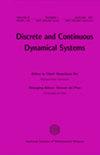用弱等连续性描述距离
IF 1.1
3区 数学
Q1 MATHEMATICS
引用次数: 0
摘要
对于作用于紧度量空间$X$上的无限离散群$G$,我们引入了沿$G$子集的几个弱版本的等连续性,并证明了如果一个最小系统$(X,G)$允许一个不变测度,那么$(X,G)$是远端的当且仅当它是两两IP $^*$ -等连续的;如果一个极小系统$(X,G)$的积系统$(X\times X,G)$有一个密集的极小点集,则$(X,G)$是远端的当且仅当它是成对的IP $^*$ -等连续的当且仅当它是成对的中心$^*$ -等连续;如果$(X,G)$是一个最小系统,且$G$是阿贝尔的,则$(X,G)$是一个阶为$\infty$的系统,当且仅当它是成对FIP $^*$ -等连续的。本文章由计算机程序翻译,如有差异,请以英文原文为准。
Characterizations of distality via weak equicontinuity
For an infinite discrete group $G$ acting on a compact metric space $X$, we introduce several weak versions of equicontinuity along subsets of $G$ and show that if a minimal system $(X,G)$ admits an invariant measure then $(X,G)$ is distal if and only if it is pairwise IP$^*$-equicontinuous; if the product system $(X\times X,G)$ of a minimal system $(X,G)$ has a dense set of minimal points, then $(X,G)$ is distal if and only if it is pairwise IP$^*$-equicontinuous if and only if it is pairwise central$^*$-equicontinuous; if $(X,G)$ is a minimal system with $G$ being abelian, then $(X,G)$ is a system of order $\infty$ if and only if it is pairwise FIP$^*$-equicontinuous.
求助全文
通过发布文献求助,成功后即可免费获取论文全文。
去求助
来源期刊
CiteScore
2.50
自引率
0.00%
发文量
175
审稿时长
6 months
期刊介绍:
DCDS, series A includes peer-reviewed original papers and invited expository papers on the theory and methods of analysis, differential equations and dynamical systems. This journal is committed to recording important new results in its field and maintains the highest standards of innovation and quality. To be published in this journal, an original paper must be correct, new, nontrivial and of interest to a substantial number of readers.

 求助内容:
求助内容: 应助结果提醒方式:
应助结果提醒方式:


